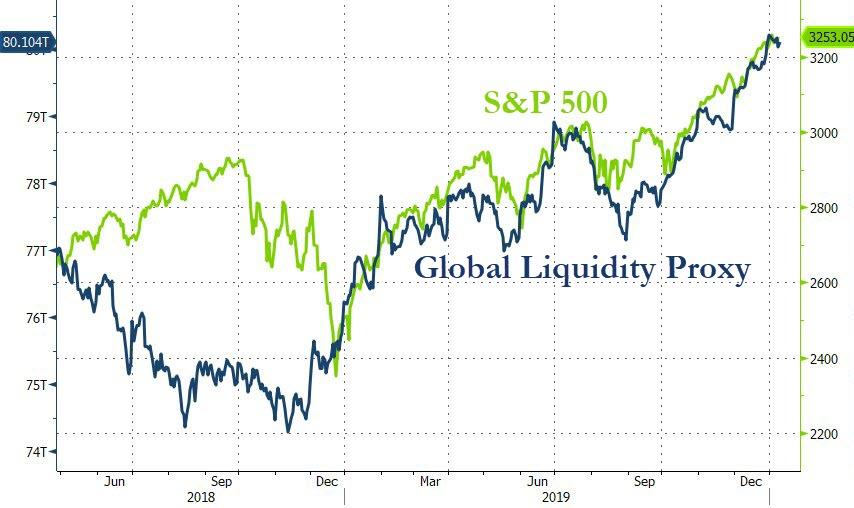Central Bankers “Have Infantilized The Business & Financial Investment Process”
The defining strategy of the 2010-2019 market was riding the monetary policy mistakes which pumped money into financial assets – it was a brilliant game for those who played it well. As Bill Blain recently noted:
The last 10-years were largely about denial of rationality by piling on risk in what looked to be risk-off markets, holding your nerve in the face of improbable market gains, all of which required a long-term suspension of disbelief.
Do these three things and you did well! It really didn’t require that much skill – just the understanding of why Central Banks could not afford to stop juicing markets via flawed monetary policy.
Correlation is not causation… especially when your salary depends on it…
Source: Bloomberg
But, as stocks soar to ever record-er record highs, Bloomberg’s Richard Breslow notes that – as Bill Blain hints at – it was a strange juxtaposition, therefore to read the official comments that are also in the news.
-
ECB President Christine Lagarde argued for EU-wide fiscal stimulus to jump-start the sluggish economy.
-
The World Bank cut growth forecasts for China and Europe and warned of downside risks generally.
-
Outgoing Bank of England Governor Mark Carney drove sterling lower by saying that the MPC is debating the need for further stimulus in response to the economy slowing below potential.
-
And a Fed deputy director in the financial stability unit warned that even a moderate recession could lead to yields at the long-end of the curve falling to “near-zero.” Just like in Japan and Europe.
Of course, we all know a lot of the feel-good pricing of assets has to do with the knowledge that central banks are just incapable of weaning themselves off the loose, looser, loosest for long, longer, longest liquidity policies. And if they can’t bear to part with this addiction, the global economy and corporate decision-makers won’t be able to either. We act as we are incentivized.
I assume we’ll get more of the same from the long list of Fed speakers on today’s schedule: “Everything is going well but know we are here to protect you.”
-
8am: Fed’s Clarida Discusses Economy, Monetary Policy in New York
-
9:30am: Fed’s Kashkari Speaks at Regional Economic Conference
-
11:30am: Fed’s Williams Speaks at BoE in London
-
12:45pm: Fed’s Barkin Speaks in Richmond
-
1:20pm: Fed’s Evans Speaks on Economic Outlook
-
2pm: Fed’s Bullard Speaks to Wisconsin Bankers
It’s becoming an example of poor parenting. At some point, we all need to try to ride the bicycle without a smothering presence running alongside and holding the back of the seat.
Source: Bloomberg
They have infantilized the business and financial investment process. And along with it continue to steadfastly embrace policies that by their own academic definition aren’t working. There isn’t only one way to fulfill a mandate. This obsession with inflation targets is merely an excuse to stay in their own comfort zone and may have little to do with the real world. Where inflation, by the way, is nowhere near as low as they want to believe.
Obviously they want to avoid a recession. Clearly they have lowered rates where they don’t feel comfortable with the room they have to maneuver. Belatedly they are realizing that negative rates are a fool’s errand. But they need to stop setting policy and guidance for a recession that isn’t here. And if one happens it won’t have anything to do with the level of interest rates. Although, they could talk us into one. They have utterly missed the boat in understanding the law of unintended consequences.
Meanwhile, back at the ranch, it’s hard not to be intrigued at the very nascent attempt of bund yields to once again push up against resistance. Some of this clearly has to do with the heavy debt issuance taking place. I’d like to think today’s German industrial production beat had a contributing influence. I’m strangely optimistic that Lagarde will have greater success than her predecessor in getting the surplus nations to kick in some monies. There are three ECB speakers today and it would be nice if their outlooks were constructive. Or at least of the glass-half-full variety.
Looking at the screens, and seeing everything look bubbly, it is sobering to realize it reflects price appreciation but not necessarily greater confidence that might lead to investment. Thinking about what asset-price movement would actually stoke business and consumer confidence, and could be a development far more consequential than just favorable mark-to-markets, it would be seeing bund yields back above zero. And the ECB shouldn’t continue to resist it happening.
As we warned overnight, just as the market got addicted to QE and the result was a 20% drop in the S&P in late 2018 when markets freaked out about Quantitative Tightening, the Fed’s shrinking balance sheet, and declining liquidity, Curvature Securities’ Scott Skyrm cautions that “it will take pain to wean the Repo market off of cheap Fed cash” since “it‘s a circle” which can be described as follows:
For the Fed to end daily RP ops, they need outside cash to come back into the Repo market. For the Repo market to attract cash, Repo rates need to move higher. For rates to move higher, the Fed needs to stop RP ops.
Does this look like they are ‘weaning’ the system off?
Remember when the liquidity shortage was a “year-end” issue? On Dec 31, the Fed had pumped a total of $255.95 billion into the market versus $258.9 billion on Friday. pic.twitter.com/w1YSabtMuF
— zerohedge (@zerohedge) January 9, 2020
Tyler Durden
Thu, 01/09/2020 – 10:00
via ZeroHedge News https://ift.tt/2sSj8bV Tyler Durden

